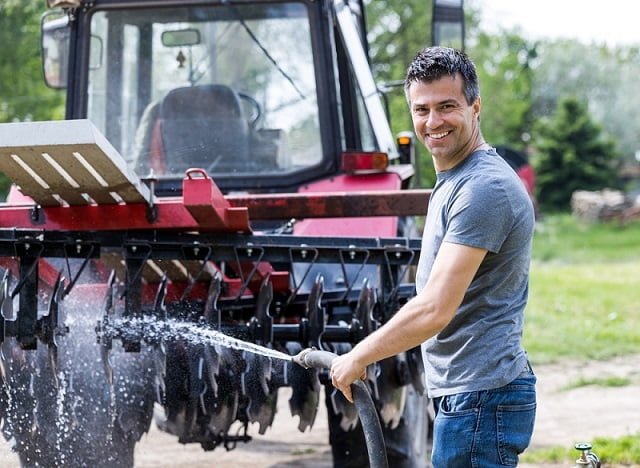Maintaining farm equipment is crucial for ensuring the efficiency and longevity of your machinery. Proper upkeep not only prevents costly repairs but also extends the life of your equipment, which is vital for the smooth running of any farming operation. Here’s a comprehensive guide on how to keep your farm equipment in peak condition for years to come.
1. Follow the Manufacturer’s Maintenance Schedule
Each piece of farm equipment comes with a manufacturer’s maintenance schedule that outlines recommended service intervals and procedures. Following these guidelines is crucial. Regularly checking and changing oil, replacing filters, and inspecting belts and hoses according to the manufacturer’s recommendations help prevent unexpected breakdowns and prolong the equipment’s life.
2. Perform Daily and Weekly Inspections
Before and after each use, conduct a brief visual inspection of your equipment, looking for any visible signs of wear or damage, such as cracked hoses, loose bolts, or leaks. For instance, if you’re dealing with hydraulic repairs in Minnesota, ensure that you check for any specific issues related to hydraulic systems. Additionally, perform a more thorough inspection weekly, checking fluid levels, tire pressures, and battery condition. Promptly addressing minor issues can help prevent them from developing into more significant problems.
3. Keep Equipment Clean
Dirt and debris can cause significant wear and tear on farm machinery. Regularly cleaning your equipment helps prevent corrosion and keeps it running smoothly. After each use, remove any mud, dirt, or crop residue. For larger cleanings, use a pressure washer or a specialized cleaning solution to ensure that all parts, including hard-to-reach areas, are thoroughly cleaned. This is especially important for machinery that operates in challenging environments, such as fields with high dust or mud content.
4. Lubricate Moving Parts
Lubrication is essential for reducing friction and preventing excessive wear on moving parts. Regularly grease components such as bearings, chains, and pivots according to the equipment’s maintenance schedule. Use the appropriate type of lubricant for each part to ensure optimal performance. Over-lubricating can be as problematic as under-lubricating, so adhere to manufacturer recommendations for the correct amount and type of lubricant.
5. Check and Maintain Fluids
Keeping fluids at the proper levels is critical for the smooth operation of farm equipment. This includes engine oil, hydraulic fluid, coolant, and fuel. Regularly check these levels and top them up as needed. Additionally, follow the recommended intervals for changing fluids to maintain optimal performance and prevent damage. Using high-quality fluids and filters can also improve efficiency and longevity.
6. Inspect and Maintain Tires
Tire maintenance is often overlooked but is crucial for equipment performance. Regularly inspect tire pressure and tread condition. Properly inflated tires ensure better traction and fuel efficiency, while worn-out or damaged tires can affect the equipment’s stability and handling. Rotate tires as needed and replace them when they show signs of excessive wear or damage.
7. Store Equipment Properly
Proper storage extends the life of farm equipment, especially during the off-season. Store machinery in a clean, dry environment to protect it from the elements. If possible, keep equipment in a shed or garage to shield it from harsh weather conditions. For long-term storage, consider performing a thorough cleaning, changing the oil, and filling the fuel tank to prevent rust and other issues.
8. Train Operators
Well-trained operators are less likely to misuse or damage equipment. Provide proper training on how to operate machinery correctly, including starting and stopping procedures, and understanding the equipment’s capabilities and limitations. Regularly review best practices with your team to ensure that everyone is up to date on proper handling and maintenance procedures.
9. Address Issues Promptly
If you notice any unusual noises, vibrations, or performance issues, address them immediately. Ignoring these signs can lead to more significant problems and costly repairs. Schedule repairs or maintenance as soon as an issue is detected to prevent further damage and ensure that your equipment is always in optimal working condition.
10. Keep Records
Maintaining detailed records of all maintenance and repairs is essential for tracking the condition of your equipment and scheduling future maintenance. Keep a log of inspections, service dates, and any repairs performed. This record helps identify patterns, plan for upcoming maintenance tasks, and ensure that you’re following the manufacturer’s guidelines.
In Conclusion
Proper maintenance of farm equipment is an investment in its longevity and reliability. By following these tips—adhering to the manufacturer’s schedule, performing regular inspections, keeping equipment clean, and addressing issues promptly—you can ensure that your machinery remains in excellent condition for years to come. A well-maintained fleet of equipment not only improves efficiency but also contributes to the overall success of your farming operation.






